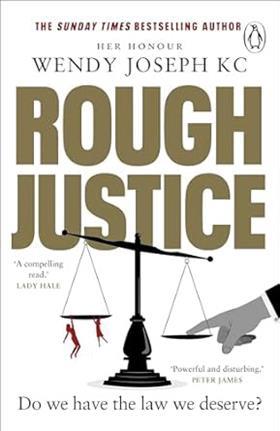Rough Justice
Her Honour Wendy Joseph KC
£22, Doubleday
★★★★✩
Until 2022, Her Honour Wendy Joseph KC dealt with the most serious cases heard at the Old Bailey. She was only the third woman to hold a permanent position at the Central Criminal Court. Now she mentors young people who want a career in criminal law, and has an interest in promoting understanding between those involved in the judicial system and wider society.
The book consists of four fictional accounts of criminal cases that illustrate the issues criminal courts must deal with and how the law deals with people involved in crime – not only the accused but also victims, witnesses, experts, advocates and judges. It is not a story of how the system is underfunded with poor buildings and underpaid staff, although that is perfectly true, but rather the individuals and families whose lives are wrecked by crime. Crime and violence shatter the lives of anyone who comes into contact.
The four tales are excellently written in a style that is light, engaging and informative. They include a child disposing of body parts, a woman accused of killing her husband, and gun crime. There are pleasing touches about the pressure on the system to react and cope. The book includes appendices of criminal law and rules which form the backdrop of the trials. The judge in the stories also dips into historical offending by using the Old Bailey’s online records to contrast and compare today’s caseload with past crimes.

The book investigates how juries are selected and serve. Some jury members give up holidays, and it is interesting how reluctant jury members get drawn into the process. The book highlights crises jury members can face in their lives and how service is demanding and challenging. Examples include an insomniac jury member and one who has a terminal illness but is eager to do their duty.
Joseph points out that once a trial starts the judge is in the hands of other people who can fall ill, forget, have childcare or carers’ disasters. There are also the pressures of listings, cases overrunning and interactions with other judges and staff. Plus a few gems on what goes on in a judge’s mind when facing the issues, questions and difficulties that come up in a trial.
Sadly, solicitors do not feature much. How do judges think cases get prepared or counsel selected and briefed? And I’m impressed with the ease and speed this court can get expert medical reports.
I enjoyed the Dickensian reference to the legal concept of marital coercion – a defence to any crime committed by a wife in the presence of her husband.
One wonders what the future holds for our criminal justice system. There is not much money or interest in the service. Will criminal solicitors downsize or reduce their capacity? Will money go into a state-run criminal defence system – whatever could go wrong with that! No one really cares about courts or legal aid until they are caught up in it.
This is a marvellous book which brings the system to life. In a way the verdict is not the only factor, it is what happens to everyone else.
David Pickup is a partner at Pickup & Scott Solicitors, Aylesbury































No comments yet